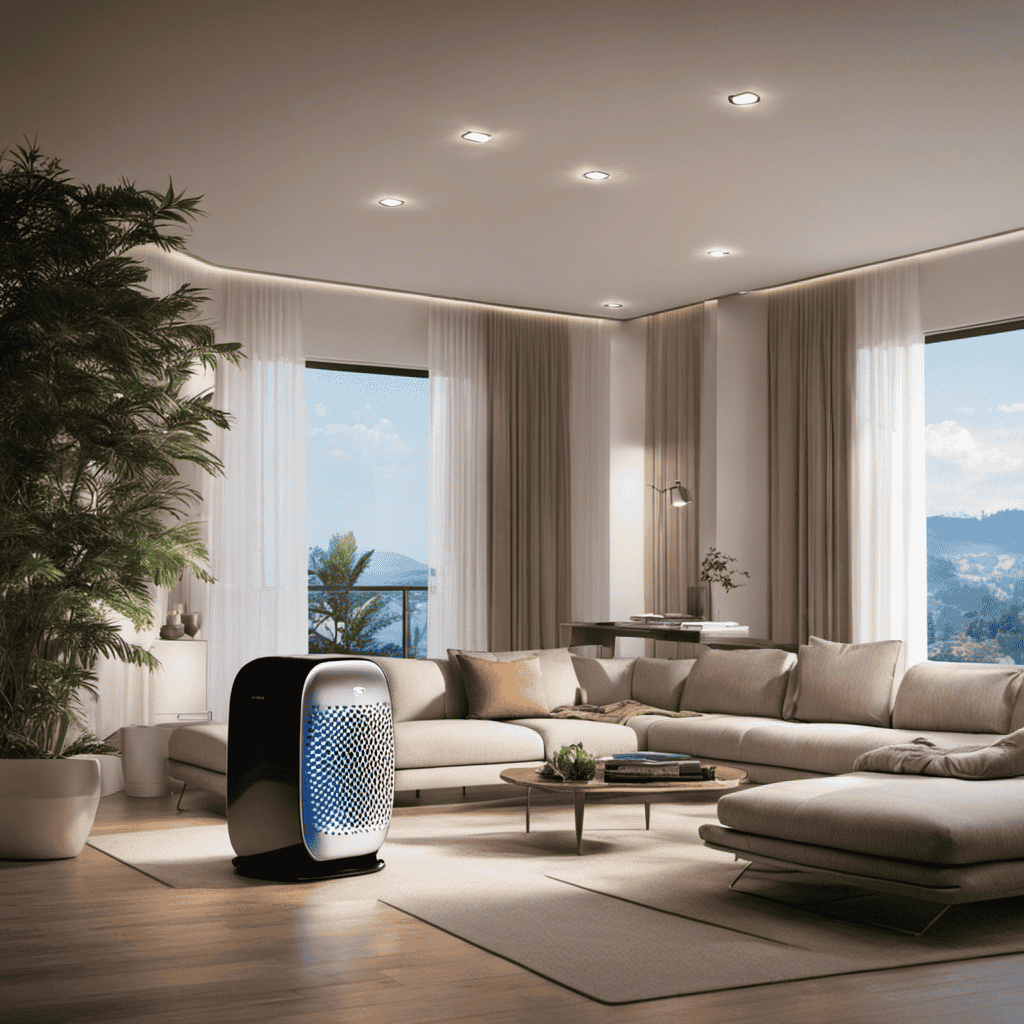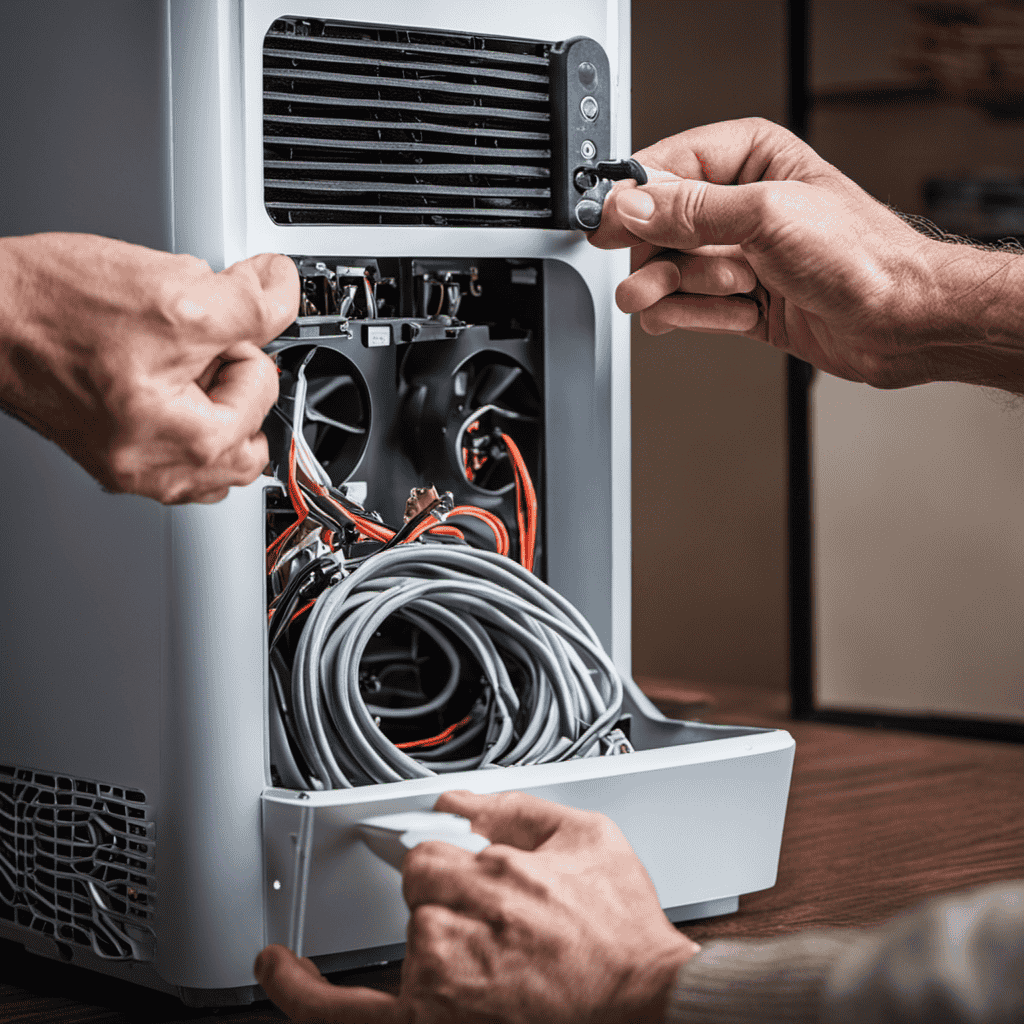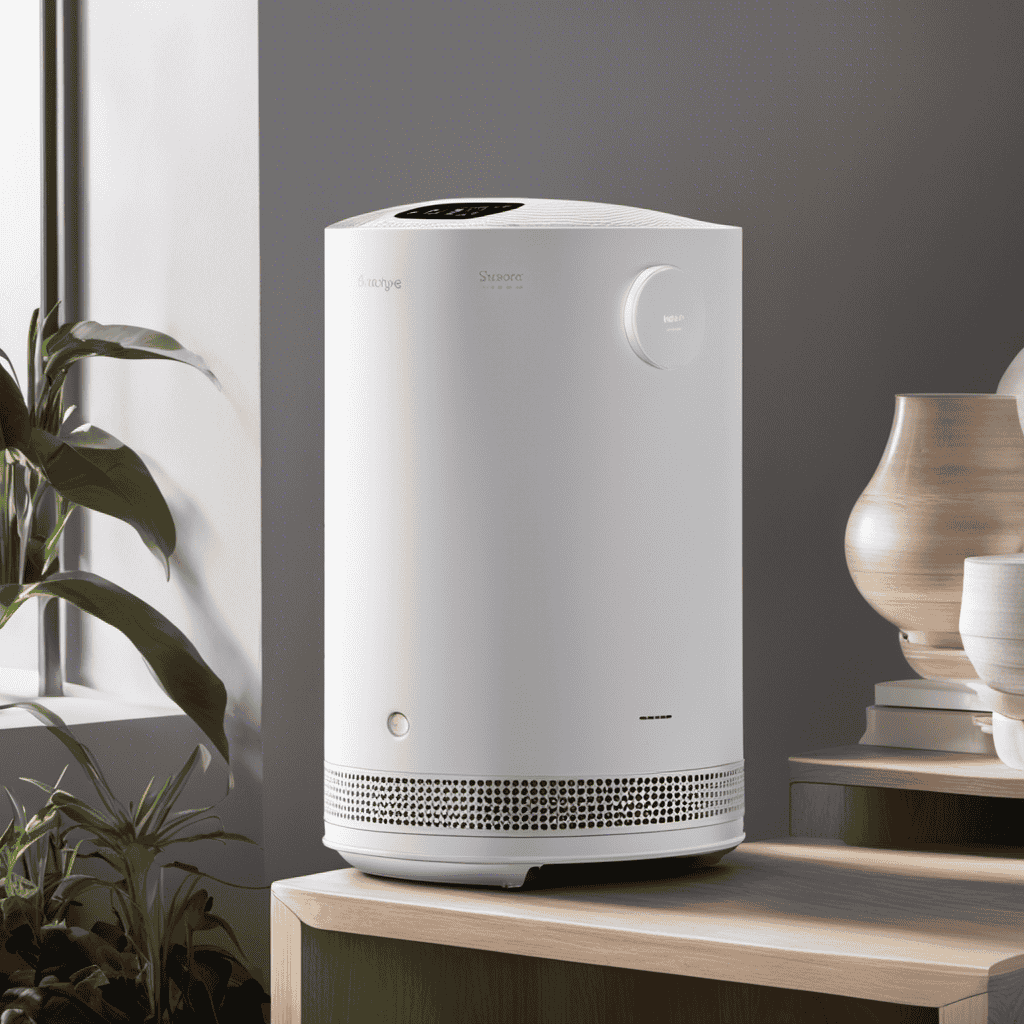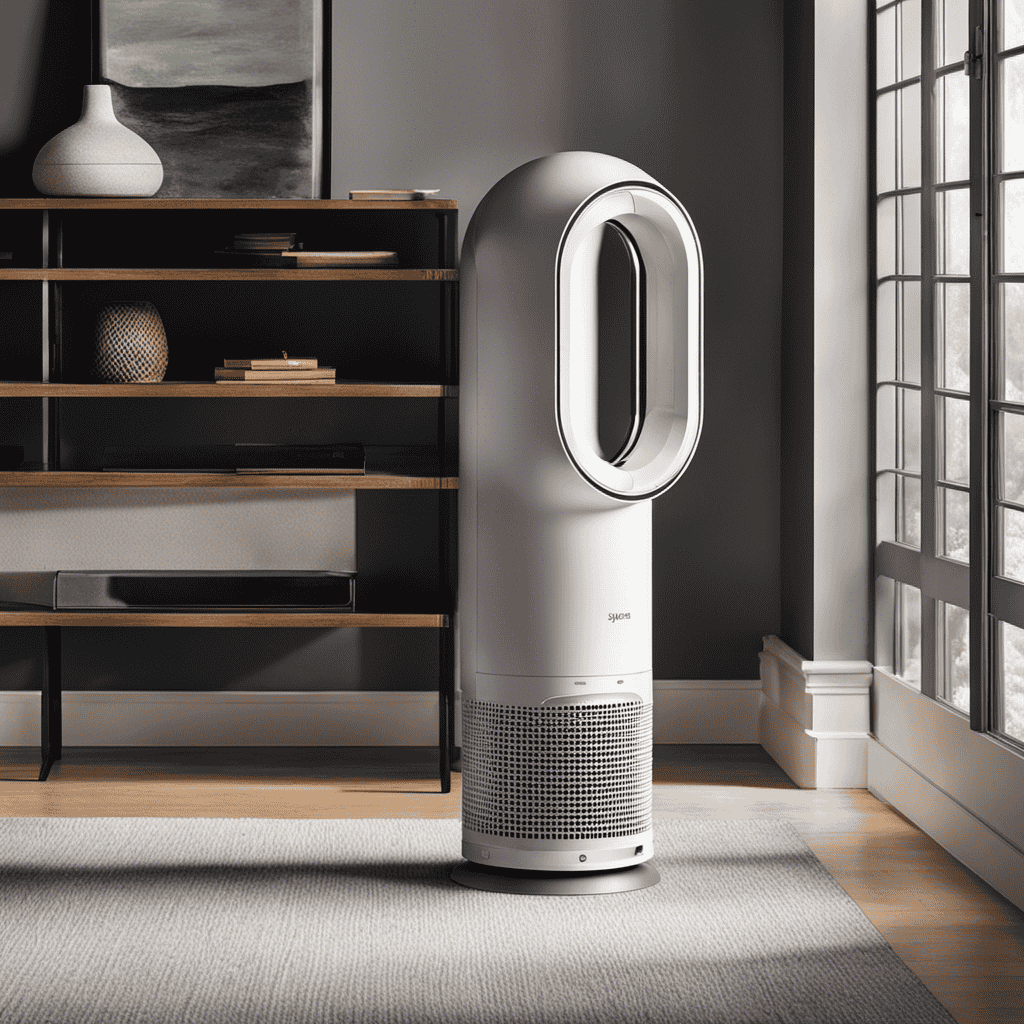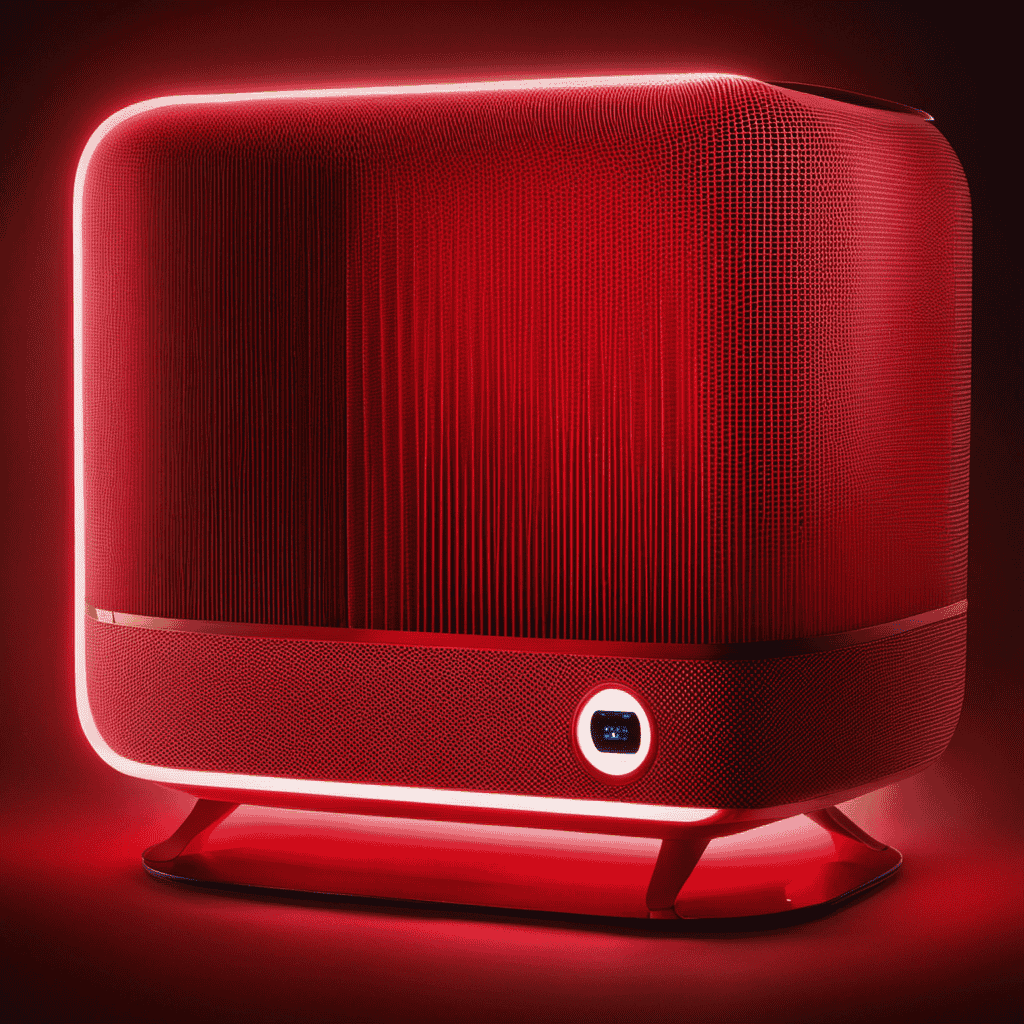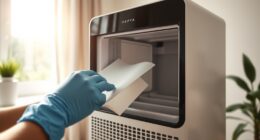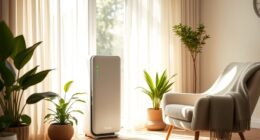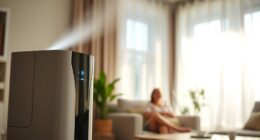As someone who is passionate about air quality, I have often pondered how long I should run my air purifier to get the best possible results. It feels like having a loyal companion that purifies the air in my surroundings, creating a refreshing sanctuary.
In this article, we will explore the recommended duration for using an air purifier, factors to consider when determining usage time, and the impact of room size on usage duration.
Get ready to uncover the secrets of air purifier usage and breathe in a world of clarity and purity.
Key Takeaways
- Recommended daily usage of an air purifier is at least 4-6 hours to ensure effective air filtration and reduce allergens and VOCs.
- Factors to consider when determining air purifier usage time include room size, air quality, specific concerns like allergies or asthma, and personal preferences.
- Environmental impact considerations include evaluating energy consumption, choosing energy-efficient models, and comparing power consumption of different models.
- It is recommended to run an air purifier for at least 8 hours a day, maintain regular and consistent usage, look for Energy Star certified models, and implement energy-saving measures.
Recommended Duration for Using an Air Purifier
You should keep an air purifier on for at least 4-6 hours a day to effectively clean the air in your home. This optimal duration ensures that the air purifier has enough time to filter out pollutants and improve indoor air quality.
By running the air purifier for this recommended period, you can experience various health benefits. Firstly, it reduces the concentration of airborne allergens such as dust mites, pollen, and pet dander, which can trigger allergies and asthma symptoms.
Secondly, it helps remove harmful volatile organic compounds (VOCs) emitted by household products, paints, and cleaning chemicals, which can have long-term health effects.
Moreover, running the air purifier for the suggested duration can also eliminate odors and improve overall freshness in your home.
Factors to Consider When Determining Air Purifier Usage Time
When it comes to using an air purifier, there are two key factors to consider: optimal usage duration and environmental impact.
Determining the optimal usage duration can help maximize the effectiveness of the air purifier while also ensuring that it operates efficiently.
Additionally, considering the environmental impact is crucial as air purifiers consume energy and may produce waste that can harm the environment.
Therefore, it is important to strike a balance between achieving clean air and minimizing negative environmental effects.
Optimal Usage Duration
To maximize the effectiveness of your air purifier, it’s important to determine the optimal usage duration. Here are three factors to consider when determining how long to keep your air purifier on:
-
Room size: The size of the room plays a crucial role in determining the duration of air purifier usage. Larger rooms may require a longer running time to adequately clean the air, while smaller rooms may need less time.
-
Air quality: The current air quality in your space is another important consideration. If you live in an area with high pollution levels or have specific air quality concerns like allergies or asthma, you may need to keep the air purifier running for longer periods of time.
-
Personal preference: Ultimately, the duration of air purifier usage depends on your personal preferences and needs. Some people prefer to keep their air purifiers on continuously for maximum air purification, while others may choose to use it only during specific times, such as when they are sleeping or when they are away from home.
Environmental Impact Considerations?
Considering the environmental impact, it’s worth evaluating the energy consumption of your air purifier and finding ways to minimize it. Energy efficient air purifiers not only help reduce your carbon footprint but also have a positive impact on indoor air quality. By choosing an energy efficient air purifier, you can effectively clean the air in your home while minimizing your energy consumption.
To better understand the energy efficiency of air purifiers, let’s compare the power consumption of different models:
| Air Purifier Model | Power Consumption (Watts) |
|---|---|
| Model A | 25 |
| Model B | 35 |
| Model C | 50 |
| Model D | 15 |
As you can see from the table, Model D is the most energy efficient option, consuming only 15 watts of power. By selecting such a model, you can significantly reduce your energy usage without compromising the air cleaning capabilities.
How Long Should You Run an Air Purifier Each Day
When considering the optimal daily usage of an air purifier, it is important to take into account the energy consumption considerations.
The recommended daily usage of an air purifier can vary depending on factors such as the size of the room, the air quality, and the specific needs of the individuals occupying the space.
It is essential to strike a balance between achieving desired air purification and minimizing energy consumption to ensure both effectiveness and efficiency.
Optimal Daily Usage
You should aim to use the air purifier for at least 8 hours each day to ensure optimal air quality in your home. Regular and consistent usage is essential for the air purifier to effectively remove pollutants and allergens from the indoor environment.
Here are some important factors to consider when using an air purifier:
-
Energy Efficiency: Look for an air purifier that is Energy Star certified. These models are designed to consume less energy while still providing efficient air purification.
-
Noise Levels: Consider the noise levels of the air purifier, especially if you plan to use it in your bedroom or office. Look for models with low noise levels, typically measured in decibels (dB), to ensure a peaceful environment.
-
Maintenance: Regularly clean or replace the air filters in your purifier according to the manufacturer’s instructions. This will help maintain the efficiency and performance of the unit.
Energy Consumption Considerations?
To ensure efficient energy consumption, it’s important to look for an air purifier that is Energy Star certified. These certified purifiers are designed to use less electricity while still providing effective air purification. By choosing an Energy Star certified air purifier, you can save on your electricity bill without compromising on the air quality in your home.
In addition to choosing an energy-efficient model, there are some energy-saving tips you can follow to further reduce your air purifier’s impact on your electricity bill. For example, you can run the air purifier only when you are in the room or during peak pollution times. You can also adjust the fan speed to a lower setting if you don’t require high filtration. By implementing these energy-saving measures, you can minimize your air purifier’s energy consumption and its impact on your electricity bill.
Now, let’s explore the impact of room size on air purifier usage duration.
The Impact of Room Size on Air Purifier Usage Duration
If your room is larger, you’ll need to keep the air purifier on for a longer duration to effectively clean the air. The size of the room plays a crucial role in determining the effectiveness of an air purifier.
Here are three key factors to consider:
-
Room Volume: A larger room has more air to filter, requiring the air purifier to run for a longer time to achieve optimal results.
-
Air Changes per Hour (ACH): A higher ACH rate ensures that the air in the room is constantly being purified. For larger rooms, a higher ACH is recommended to maintain clean air.
-
Filtration Rate: The speed at which the air purifier filters the air is important in larger rooms. Look for a purifier with a higher Clean Air Delivery Rate (CADR) to effectively clean the air in a shorter time.
Understanding the impact of room size on air purifier usage duration is essential for maintaining clean and healthy indoor air quality.
Now, let’s delve into a guide for understanding the air quality in your home and how to use an air purifier effectively.
Understanding the Air Quality in Your Home: A Guide to Air Purifier Usage
When it comes to using an air purifier, understanding the optimal duration is crucial. Factors such as room size, air quality, and personal preferences can all affect how long you should keep your air purifier on.
Optimal Air Purifier Duration
You should consider keeping the air purifier on for at least 8 hours a day to ensure optimal air quality in your home. This duration allows the air purifier to effectively filter and circulate the air, removing pollutants, allergens, and other harmful particles. Here are three reasons why this is important:
-
Environmental Impact: By running the air purifier for 8 hours a day, you can minimize the environmental impact. It ensures that the purifier operates efficiently without unnecessarily consuming excess energy.
-
Energy Efficiency: Keeping the air purifier on for the recommended duration promotes energy efficiency. Many modern air purifiers are designed to be energy-efficient, and running them for 8 hours strikes a balance between maintaining good air quality and conserving energy.
-
Continuous Filtration: Running the air purifier for the recommended duration allows for continuous filtration. This is particularly important if you have pets, smokers, or live in an area with high pollution levels. Continuous filtration helps to maintain clean, fresh air throughout the day, enhancing your overall well-being.
Factors Affecting Air Quality
One factor that significantly affects the quality of the air in your home is the presence of indoor pollutants. These pollutants can come from various sources such as cooking, cleaning products, and even furniture. To ensure healthy indoor air quality, it is important to regularly monitor the air and take necessary measures to maintain it.
This includes using air purifiers and performing regular maintenance on them. Air purifiers help remove harmful particles from the air, but they need to be properly maintained to work effectively. This includes cleaning or replacing filters as recommended by the manufacturer.
By regularly monitoring the air quality and maintaining the air purifier, you can ensure that the air in your home remains clean and healthy.
To continue improving the air quality in your home, it is also important to adjust the usage of your air purifier based on the outdoor air quality.
Adjusting Air Purifier Usage Based on Outdoor Air Quality
To determine how long to keep your air purifier on, simply check the outdoor air quality. During wildfire season, it’s crucial to adjust your air purifier settings based on the indoor air quality readings.
Here are three key factors to consider:
-
PM2.5 Levels: Fine particulate matter, known as PM2.5, is a major concern during wildfires. Monitor the outdoor PM2.5 levels using reliable sources like air quality indexes. If the levels are high, keep your air purifier running for longer periods.
-
Smoke Odor: Pay attention to the presence of smoke odor indoors. If you can smell smoke, it indicates that harmful particles may be present. In such cases, keep the air purifier on to continuously filter the air and reduce the odor.
-
Visibility: Reduced visibility due to smoke is a clear indicator of poor air quality. If you notice hazy conditions or decreased visibility, it’s advisable to keep your air purifier running to help maintain a healthier indoor environment.
Considering these factors will help you determine the appropriate duration for running your air purifier during wildfire season.
Now, let’s explore the role of seasonal allergies in determining air purifier usage time.
The Role of Seasonal Allergies in Determining Air Purifier Usage Time
If seasonal allergies are a concern for you, it’s important to consider how they can influence the amount of time your air purifier should be running. Seasonal allergies can significantly impact indoor air quality and, therefore, affect the effectiveness and usage time of an air purifier. The severity of allergies and the size of the room are key factors in determining the appropriate running time for an air purifier.
To give you a better understanding, let’s consider the impact of room size on air purifier usage. The table below illustrates the recommended running time based on room size:
| Room Size (square feet) | Recommended Running Time |
|---|---|
| 100-250 | 6-8 hours |
| 250-500 | 8-10 hours |
| 500-1000 | 10-12 hours |
| 1000-1500 | 12-14 hours |
| 1500+ | 14-16 hours |
Additionally, the outdoor air quality adjustment is essential. If you live in an area with high levels of pollen or other allergens during certain seasons, you may need to increase the running time of your air purifier to combat the influx of outdoor particles. It’s crucial to monitor the outdoor air quality and adjust the usage time accordingly.
Do Pets Affect the Duration of Air Purifier Usage
Pets can impact how long you run your air purifier due to the presence of pet dander and other allergens they may introduce into the indoor air. As a pet owner, it is important to consider the following factors when determining the duration of air purifier usage:
-
Shedding: Pets, especially those with long hair, tend to shed fur and dander regularly. This can quickly accumulate in the air and reduce the effectiveness of your purifier.
-
Allergies: If you or your family members have allergies to pet dander, it is crucial to keep the air purifier running for longer periods to minimize the allergens in the air.
-
Maintenance: Regularly cleaning and maintaining your air purifier is essential when you have pets. Pet hair and dander can clog the filters, reducing their efficiency. By keeping the purifier well-maintained, you can ensure optimal air quality.
How Long Should You Use an Air Purifier to Combat Odors
When it comes to combating odors with an air purifier, it is important to find a balance in its usage. Simply leaving the purifier on all the time may not be necessary and could lead to unnecessary energy consumption. Instead, it is recommended to adjust the usage based on the air quality in your surroundings. For example, if you have cooked a meal that has left a strong odor in the kitchen, you might want to keep the air purifier running for a few hours to eliminate the smell. On the other hand, if the air quality is generally good, you can reduce the usage to specific periods, such as during the night or when you are away from home. By finding the right balance, you can effectively combat odors while minimizing energy consumption.
| Pros | Cons |
|---|---|
| Eliminates odors | Increased energy use |
| Improves air quality | Potential noise |
| Reduces allergens | Higher electricity bills |
| Creates a fresh scent | |
Balancing Energy Consumption and Air Purifier Usage Time
Finding the right balance in air purifier usage can help minimize energy consumption. Here are some energy-saving tips and ways to maximize air purifier efficiency:
-
Opt for energy-efficient models: Look for air purifiers with the ENERGY STAR label, as they are designed to consume less energy while providing effective air purification.
-
Use the timer function: Set the air purifier to run only when needed, such as during the day when you’re at home or during the night while you sleep. This helps to reduce unnecessary energy consumption.
-
Keep the air purifier clean: Regularly clean and replace the filters according to the manufacturer’s instructions. Dirty filters can reduce the efficiency of the air purifier and make it work harder, consuming more energy.
The Relationship Between Air Purifier Filter Lifespan and Usage Duration
When it comes to air purifiers, understanding the optimal filter replacement frequency is crucial for maintaining clean and healthy air.
The impact of usage frequency on filter lifespan is also important to consider, as frequent usage can lead to quicker filter degradation.
However, there are strategies that can be implemented to extend the lifespan of air purifier filters, such as regular cleaning and proper maintenance.
Optimal Filter Replacement Frequency
The optimal frequency for replacing air purifier filters varies depending on the model and usage. To ensure maximum efficiency and clean air, it’s important to follow recommended filter maintenance guidelines.
Here are three key factors to consider:
-
Filter Type: Different air purifiers use different types of filters, such as HEPA or activated carbon filters. Each filter type has its own lifespan and efficiency. It’s crucial to replace the filters based on the manufacturer’s recommendations.
-
Environmental Conditions: The air quality in your surroundings can affect the lifespan of the filter. If you live in an area with high levels of pollutants or allergens, you may need to replace the filter more frequently to maintain optimal performance.
-
Usage Habits: The frequency at which you use your air purifier also impacts the filter’s lifespan. If you use it constantly or for extended periods, the filter may need to be replaced more often.
Understanding these factors will help you extend filter efficiency and ensure clean air in your home.
Now, let’s explore the impact of usage frequency on air purifier filter lifespan.
Impact of Usage Frequency
To maximize the lifespan of your filter, be mindful of how often you use the device. Using an air purifier for longer durations can increase its energy consumption and impact electricity bills. Here are some energy-saving tips to consider:
| Usage Frequency | Impact on Electricity Bills |
|---|---|
| Continuous use | Higher energy consumption |
| Intermittent use | Lower energy consumption |
Extending Filter Lifespan
Using the air purifier intermittently can help extend the lifespan of the filter. By allowing the filter to rest periodically, it can effectively trap and remove more particles from the air, resulting in improved air quality.
Here are three ways to maintain air purifier efficiency and prolong the filter’s lifespan:
-
Clean and vacuum regularly: Dust and debris can accumulate on the filter, reducing its effectiveness. Regularly cleaning and vacuuming the filter helps remove these particles, ensuring optimal performance.
-
Replace filters as recommended: Filters have a limited lifespan, and using them beyond their recommended usage can decrease efficiency. Follow the manufacturer’s guidelines for filter replacement to maintain air purifier effectiveness.
-
Keep the air purifier in a clean environment: Dust and dirt in the surrounding area can quickly accumulate on the filter, clogging it and reducing its lifespan. Placing the air purifier in a clean environment helps prevent excess buildup and extends the filter’s lifespan.
How Long Should You Keep an Air Purifier on During Sleep
During sleep, you’ll want to keep the air purifier on for at least six to eight hours to ensure optimal air quality and promote better sleep.
The effectiveness of an air purifier in balancing sleep quality lies in its ability to remove airborne pollutants and allergens from the indoor environment. By running the air purifier for an extended period during sleep, you allow it to continuously filter the air, reducing the concentration of pollutants and creating a cleaner breathing space.
This is especially beneficial for individuals with respiratory conditions or allergies, as it helps minimize potential triggers that can disrupt sleep. However, it’s important to note that air purifier effectiveness also depends on factors like room size, air purifier capacity, and the quality of the air filters used.
Therefore, it’s crucial to choose an air purifier that suits your specific needs and follow the manufacturer’s recommendations for optimal usage.
Air Purifier Usage in High-Traffic Areas: Best Practices
In high-traffic areas, it’s essential to regularly clean and maintain your air purifier for optimal performance. Here are three key practices for air purifier maintenance in such areas:
-
Clean or replace the air filters: In high-traffic areas, the air purifier’s filters can quickly become clogged with dust, pollen, and other pollutants. Regularly clean or replace the filters to ensure the air purifier continues to effectively remove airborne particles.
-
Check the fan and motor: The constant use of the air purifier in high-traffic areas can put a strain on the fan and motor. Inspect these components regularly to ensure they are functioning properly and clean any accumulated debris.
-
Monitor the air quality: Use air quality sensors or indicators to monitor the effectiveness of your air purifier in high-traffic areas. If the air quality is not improving or remains poor despite regular maintenance, it may be time to consider upgrading to a more powerful air purifier.
Effective Air Purifier Usage for Asthma and Allergy Relief
In high-traffic areas, air purifiers play a crucial role in improving indoor air quality. However, when it comes to asthma and allergy relief, effective usage becomes even more important.
As someone who suffers from allergies, I understand the significance of using an air purifier properly. To ensure maximum relief, it is essential to keep the purifier on continuously, especially in the rooms where you spend the most time. This will ensure that the air is constantly being filtered, removing allergens and irritants that trigger your symptoms.
However, it is important to note that leaving the purifier on all the time can consume a significant amount of energy. To save energy and maintain your air purifier, make sure to clean or replace the filters regularly, as instructed by the manufacturer. Additionally, consider using a timer or scheduling feature to turn the purifier on and off when needed.
How to Determine the Ideal Duration for Air Purifier Usage
To figure out how long to run your air purifier, it’s important to consider factors such as room size, air quality, and your specific needs. The ideal usage duration of an air purifier varies depending on these factors. Here are three key considerations for determining optimal usage:
-
Room size: Larger rooms may require longer air purifier usage to effectively filter the air. Smaller rooms, on the other hand, may only need a shorter duration to achieve the same results.
-
Air quality: If you live in an area with high levels of pollution or allergens, you may need to run your air purifier for longer periods of time to maintain clean air.
-
Specific needs: If you suffer from allergies or respiratory conditions, you may need to keep your air purifier on continuously or for extended periods to alleviate symptoms and improve air quality in your living space.
Considering these factors will help you determine the ideal duration for running your air purifier and achieve the best results for your specific circumstances.
Frequently Asked Questions
Can an Air Purifier Be Left on All the Time?
Leaving an air purifier on all the time has its pros and cons. On one hand, it ensures continuous purification of the air. On the other hand, it can increase energy consumption and wear out the device faster.
Should I Turn off the Air Purifier When I Leave the House?
When leaving the house, it is recommended to turn off the air purifier. This helps conserve energy and prolong the lifespan of the purifier. However, air purifiers can be used in cars and hotels for improved air quality.
Can I Use an Air Purifier in Multiple Rooms at the Same Time?
Using air purifiers in multiple rooms, such as a bedroom and living room, can be beneficial. However, there are pros and cons to consider. It helps improve air quality but may increase energy consumption and noise levels.
Should I Use an Air Purifier in My Office or Workplace?
In my office, I use an air purifier to improve workplace air quality. It helps remove pollutants and allergens, creating a healthier environment. But how long should I keep it on?
Can I Use an Air Purifier in a Baby’s Nursery or Children’s Room?
Using an air purifier in a baby’s nursery or children’s room can have numerous benefits, such as improving indoor air quality and reducing allergens. However, it is important to choose the right air purifier and follow precautions to ensure safety.
Conclusion
In conclusion, it is recommended to keep an air purifier on for a sufficient amount of time to ensure optimal air quality. Like a vigilant sentinel, the purifier tirelessly removes impurities from the air, creating a sanctuary of freshness.
The duration of air purifier usage depends on factors such as room size, air quality, and specific needs such as asthma or allergies.
By understanding these factors, one can determine the ideal duration for air purifier usage and enjoy the benefits of cleaner, healthier air.

